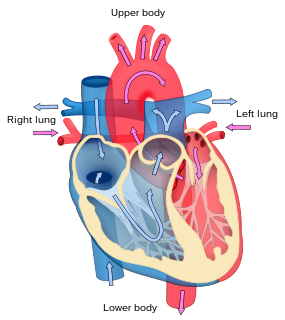
Cardiology is a branch of medicine that deals with the disorders of the heart as well as some parts of the circulatory system. The field includes medical diagnosis and treatment of congenital heart defects, coronary artery disease, heart failure, valvular heart disease and electrophysiology. Physicians who specialize in this field of medicine are called cardiologists, a specialty of internal medicine. Pediatric cardiologists are pediatricians who specialize in cardiology. Physicians who specialize in cardiac surgery are called cardiothoracic surgeons or cardiac surgeons, a specialty of general surgery.

Blood pressure (BP) is the pressure of circulating blood against the walls of blood vessels. Most of this pressure results from the heart pumping blood through the circulatory system. When used without qualification, the term "blood pressure" refers to the pressure in the large arteries. Blood pressure is usually expressed in terms of the systolic pressure over diastolic pressure in the cardiac cycle. It is measured in millimeters of mercury (mmHg) above the surrounding atmospheric pressure.

Pulmonology or pneumology is a medical specialty that deals with diseases involving the respiratory tract. It is also known as respirology, respiratory medicine, or chest medicine in some countries and areas.
Pathophysiology – a convergence of pathology with physiology – is the study of the disordered physiological processes that cause, result from, or are otherwise associated with a disease or injury. Pathology is the medical discipline that describes conditions typically observed during a disease state, whereas physiology is the biological discipline that describes processes or mechanisms operating within an organism. Pathology describes the abnormal or undesired condition, whereas pathophysiology seeks to explain the functional changes that are occurring within an individual due to a disease or pathologic state.

Pulmonary hypertension is a condition of increased blood pressure within the arteries of the lungs. Symptoms include shortness of breath, syncope, tiredness, chest pain, swelling of the legs, and a fast heartbeat. The condition may make it difficult to exercise. Onset is typically gradual.

Prostacyclin (also called prostaglandin I2 or PGI2) is a prostaglandin member of the eicosanoid family of lipid molecules. It inhibits platelet activation and is also an effective vasodilator.
Hypoxic pulmonary vasoconstriction (HPV), also known as the Euler-Liljestrand mechanism, is a physiological phenomenon in which small pulmonary arteries constrict in the presence of alveolar hypoxia. By redirecting blood flow from poorly-ventilated lung regions to well-ventilated lung regions, HPV is thought to be the primary mechanism underlying ventilation/perfusion matching. The process might initially seem counterintuitive, as low oxygen levels might theoretically stimulate increased blood flow to the lungs to increase gas exchange. However, the purpose of HPV is to distribute bloodflow regionally to increase the overall efficiency of gas exchange between air and blood. While the maintenance of ventilation/perfusion ratio during regional obstruction of airflow is beneficial, HPV can be detrimental during global alveolar hypoxia which occurs with exposure to high altitude, where HPV causes a significant increase in total pulmonary vascular resistance, and pulmonary arterial pressure, potentially leading to pulmonary hypertension and pulmonary edema. Several factors inhibit HPV including increased cardiac output, hypocapnia, hypothermia, acidosis/alkalosis, increased pulmonary vascular resistance, inhaled anesthetics, calcium channel blockers, positive end-expiratory pressure (PEEP), high-frequency ventilation (HFV), isoproterenol, nitric oxide, and vasodilators.

Endothelins are peptides with receptors and effects in many body organs. Endothelin constricts blood vessels and raises blood pressure. The endothelins are normally kept in balance by other mechanisms, but when overexpressed, they contribute to high blood pressure (hypertension), heart disease, and potentially other diseases.
Elizabeth Nabel is an American cardiologist and the current Executive Vice President of Strategy at ModeX Therapeutics in Natick, Massachusetts. Prior to this role, she served as President of Brigham Health and its Brigham and Women's Hospital, Professor of Medicine at Harvard Medical School, and Director of the NIH's National Heart, Lung, and Blood Institute.

Idiopathic pulmonary fibrosis (IPF) is a rare, progressive illness of the respiratory system, characterized by the thickening and stiffening of lung tissue, associated with the formation of scar tissue. It is a type of chronic scarring lung disease characterized by a progressive and irreversible decline in lung function. The tissue in the lungs becomes thick and stiff, which affects the tissue that surrounds the air sacs in the lungs. Symptoms typically include gradual onset of shortness of breath and a dry cough. Other changes may include feeling tired, and abnormally large and dome shaped finger and toenails. Complications may include pulmonary hypertension, heart failure, pneumonia, or pulmonary embolism.

Peter Lin is an American vascular surgeon, medical researcher, specializing in minimally invasive endovascular treatment of vascular disease. He has published extensively in the area of vascular surgery and endovascular surgery.
Joe G. N. "Skip" Garcia is an American pulmonary scientist, physician and academician.
Jonathan L. Halperin is an American cardiologist and the author of Bypass (ISBN 0-89586-509-2), among the most comprehensive works on the subject of coronary artery bypass surgery. In addition, he is the Robert and Harriet Heilbrunn Professor of Medicine at The Mount Sinai School of Medicine as well as Director of Clinical Cardiology in the Zena and Michael A. Wierner Cardiovascular Institute at The Mount Sinai Medical Center, both in New York City. Halperin was the principal cardiologist responsible for both the design and execution of the multi-center Stroke Prevention in Atrial Fibrillation (SPAF) clinical trials, funded by the National Institutes of Health, which helped develop antithrombotic strategies to prevent stroke, and he subsequently directed the SPORTIF clinical trials, which evaluated the first oral direct thrombin inhibitor for prevention of stroke in patients with atrial fibrillation.
The American Society for Investigative Pathology (ASIP) is a society of biomedical scientists who investigate mechanisms of disease. ASIP membership includes scientists in the academic, government, hospital, and pharmaceutical arenas that focus their research on the pathogenesis, classification, diagnosis and manifestations of disease. Research findings are ultimately used in the understanding, diagnosis and treatment of human diseases. The word pathology is derived from the Greek word "pathos" meaning "disease."
Jeffrey M. Drazen was the editor-in-chief of The New England Journal of Medicine from 2000 to 2019. He currently holds the positions of editor of New England Journal of Medicine Group,senior physician at the Brigham and Women’s Hospital, Distinguished Parker B. Francis Professor of Medicine at Harvard Medical School, professor of physiology at the Harvard School of Public Health, and adjunct professor of medicine at the Boston University School of Medicine. He is the recipient of honorary degrees from the University of Ferrara, the. University of Paris-Sud, and the University of Athens.
Ronald Jonathan Falk, MD, FACP, FASN is the Nan and Hugh Cullman Eminent Professor and Chair of the Department of Medicine at the University of North Carolina-Chapel Hill (UNC). He is a clinical nephrologist and internationally recognized expert in anti-neutrophil cytoplasmic autoantibody (ANCA)-induced vasculitis and autoimmune kidney disease. His career as a translational physician-scientist spans more than three decades. His clinical practice and translational research focus on characterizing the cell, tissue and physiologic changes in the development of specific autoimmune kidney diseases and developing new approaches for studying autoimmunity, inflammation and basic neutrophil/monocyte biology. He was Chief of the UNC Division of Nephrology and Hypertension from 1993-2015. He co-founded the UNC Kidney Center in 2005 and continues as Co-Director. Falk is a Past-President of the American Society of Nephrology (ASN). Since 2015, he has served as Chair of the Department of Medicine at UNC.
Rhian Merry Touyz Koppel is a South African medical researcher. She is the Assistant Director of the Institute of Cardiovascular and Medical Sciences (ICAMS), University of Glasgow, and the Vice-President of the International Society of Hypertension.
Suzanne Oparil is a clinical cardiologist and Distinguished Professor of Medicine, Professor of Cell, Developmental, and Integrative Biology. She is the Section Chief of Vascular Biology and Hypertension and the Director of the Vascular Biology and Hypertension Program of the Division of Cardiovascular Disease at the University of Alabama-Birmingham (UAB) Medical School.
Alison Marion Gurney is professor of Pharmacology at the University of Manchester. She previously held the W.C. Bowman Chair of Pharmacology at the University of Strathclyde, where she was the first female appointed to a science professorship and the first female Professor of Pharmacology in Scotland. She is known for her research into the pharmacology and physiological roles of ion channels, especially in the pulmonary circulation.
Nancy J. Brown, M.D. is an American physician-scientist. She is the Jean and David W. Wallace Dean and C.N.H. Long Professor of Internal Medicine at Yale University School of Medicine, having formerly served as the Hugh Jackson Morgan Professor of Medicine and Pharmacology, and Chair and Physician-in-Chief Department of Medicine at Vanderbilt University School of Medicine.








